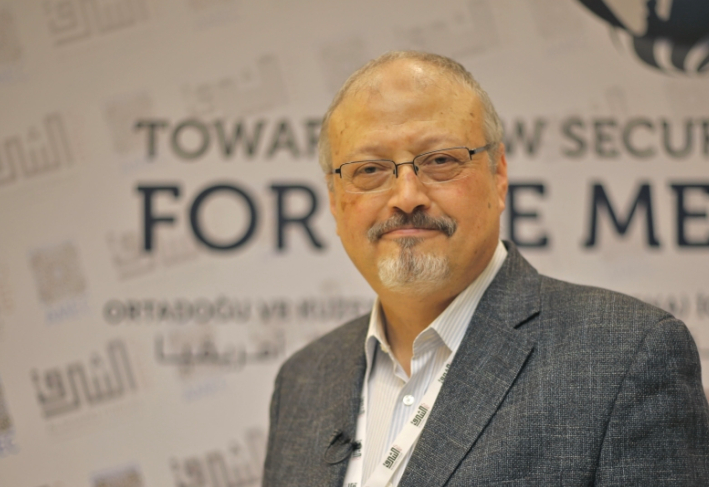Jamal Khashoggi, Casualty of War
In the global war on democracy, the war zone has no borders and journalists are no longer seen as non-combatants.

Anadolou
Lisa Van Dusen/For the Hill Times
October 24, 2018
Jamal Khashoggi had a vulnerability. It was a variable that weighed disproportionately in his risk-benefit calculations and that, for his assassins, amounted to an Achilles’ heel. It wasn’t power, money, fame, or security—or any of the lesser exploitable weaknesses leveraged by intelligence interests for operational purposes. It was love.
It was love that outweighed any sadly underestimated fear of venturing into what amounted to enemy territory on Oct. 2 to get the documents he needed to marry his 36-year-old fiancée, Hatice Cenzig. “After the consulate, we were going to buy appliances for our new home and set a date,” Cenzig wrote in a Washington Post op-ed posted Oct. 9. “All we needed was a piece of paper.”
Watching the video of Khashoggi, 59, striding into the consulate on Beşiktaş Street that day, it’s hard not to imagine what was going through his head. As someone who had become a critic-in-exile of the Kingdom’s misdirectional reformer and heir apparent, Crown Prince Mohammed bin Salman, he surely had misgivings, though Cengiz wrote that he had reassured her about the danger. “It would be a violation of international law to harm, arrest, or detain people at a diplomatic mission, he said,” according to her.
In that sense, Khashoggi’s confidence that day—apparent in his man-on-a-mission gait—stemmed from his failure to grasp the fact that his context, particularly the degree to which the definition of what can happen to a journalist for being a journalist, and where those things can happen, had changed. He couldn’t know that what he had rationalized as a brief, transactional, and possibly awkward means to a happy end had been designated a far more unpleasant means to a horrifying end by the men waiting for him.
One unmistakable message in the removal of a writer’s fingers as the first step in his butchering is that if you write the truth about people who’d rather you didn’t, your death will become a high-value operational imperative.
Khashoggi was a man with a reputation for putting principle above fear, who wrote for a major Western news publication, and whose death would therefore not go unreported, especially if the details were cinematic and barbaric enough to galvanize the world’s attention. He didn’t die by chemically induced heart attack, untimely car accident or tactical food poisoning. The fact that what could have been carried out by Saudi intelligence without leaving a single fingerprint much less generating a rolling epic of global headlines was undertaken on diplomatic premises by a death squad of 15 flown in by private jet would indicate that discretion wasn’t an operational priority.
At a time when democracy and the existing rules-based international order are under attack by interests who wish to replace them with a system more amenable to their taste for control and absolute power, journalism and journalists, being purveyors of truth, have gone from being protected non-combatants to being strategic targets.
Khashoggi’s death is just the latest Mafia-like execution of a journalist in a trend that, like other authoritarian norms, has now jumped the borders of non-democracies.
One unmistakable message in the removal of a writer’s fingers as the first step in his butchering is that if you write the truth about people who’d rather you didn’t, your death will become a high-value operational imperative. Another is that the possibility of the world knowing how such corrections are conducted has gone from being a disincentive to being a bonus, no matter how many denials, revisions, or apologies are issued amid the backlash.
In the international race to the bottom of bullying brutality, it seems that publicly demeaning a journalist is worth 50 points, body-slamming a journalist is worth 100 points, arresting a journalist is worth 500, and dismembering a journalist is worth 10,000.
How terribly sad that Jamal Khashoggi must have thought, when he walked into the consulate that day, that his new life was only just beginning.
Lisa Van Dusen is associate editor and deputy publisher of Policy Magazine. She was Washington columnist for the Ottawa Citizen and Sun Media, international writer for Peter Jennings at ABC News, and an editor at AP National in New York and UPI in Washington.
